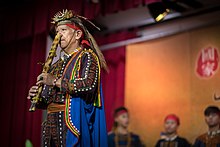
Back Paiwaniz Breton Paiwan-cŭk CDO Paiwan German Paiwan (pueblo) Spanish Paiwanit Finnish Paiwan French Phài-vân-chhu̍k HAK Suku Paiwan ID Paiwan Italian パイワン族 Japanese
Kacalisian | |
|---|---|
 Paiwan man playing a bamboo nose flute. | |
| Total population | |
| 104,555[1] (Nov 2021) | |
| Regions with significant populations | |
| Taiwan | |
| Languages | |
| Paiwan, Mandarin | |
| Religion | |
| Animism, Christianity | |
| Related ethnic groups | |
| Malayo-Polynesians, Taiwanese indigenous peoples |
The Paiwan (Paiwan: Kacalisian; Chinese: 排灣; Pe̍h-ōe-jī: Pâi-oan; Zhuyin Fuhao: ㄆㄞˊㄨㄢ) are an indigenous people of Taiwan. They speak the Paiwan language. In 2014, the Paiwan numbered 96,334. This was approximately 17.8% of Taiwan's total indigenous population, making them the second-largest indigenous group.[2][3]
The majority of Paiwan people live in the southern chain of the Central Mountain Range, from Damumu Mountain and the upper Wuluo River in the north of the southern chain to the Hengchun Peninsula in the south of it, and also in the hills and coastal plains of southeastern Taiwan. There are two subgroups under the Paiwan people: the Raval and the Butsul.[4]
The unique ceremonies in Paiwan are Masaru and Maleveq. The Masaru is a ceremony that celebrates the harvest of rice, whereas the Maleveq commemorates their ancestors or gods.
- ^ "The Tribes in Taiwan" (in Chinese (Taiwan)). Council of Indigenous Peoples. 20 December 2010. Retrieved 2022-01-13.
- ^ Hsieh, Chia-chen; Wu, Jeffrey (February 15, 2015). "Amis Remains Taiwan's Biggest Aboriginal Tribe at 37.1% of Total". Focus Taiwan News Channel. Central News Agency. Archived from the original on 2015-02-16.
- ^ "Table 28: Indigenous Population Distribution in Taiwan-Fukien Area". Preliminary Statistical Analysis Report of 2000 Population and Housing Census. National Statistics, Republic of China (Taiwan). Archived from the original (RTF) on October 30, 2014. Retrieved August 30, 2006.
- ^ "Paiwan". Digital Museum of Taiwan Indigenous Peoples. Archived from the original on January 4, 2010. Retrieved December 3, 2015.